-
 Bitcoin
Bitcoin $88,575.4133
1.33% -
 Ethereum
Ethereum $1,623.1195
-0.94% -
 Tether USDt
Tether USDt $1.0000
0.01% -
 XRP
XRP $2.1040
-0.96% -
 BNB
BNB $605.9509
0.36% -
 Solana
Solana $139.9862
-0.01% -
 USDC
USDC $1.0000
0.00% -
 Dogecoin
Dogecoin $0.1637
1.09% -
 TRON
TRON $0.2482
1.98% -
 Cardano
Cardano $0.6392
-1.18% -
 Chainlink
Chainlink $13.3059
-1.43% -
 UNUS SED LEO
UNUS SED LEO $9.0739
-4.00% -
 Avalanche
Avalanche $20.1274
-2.31% -
 Stellar
Stellar $0.2484
-4.08% -
 Sui
Sui $2.3116
2.05% -
 Shiba Inu
Shiba Inu $0.0...01252
-0.73% -
 Toncoin
Toncoin $2.9119
-3.20% -
 Hedera
Hedera $0.1725
0.04% -
 Bitcoin Cash
Bitcoin Cash $346.0750
1.19% -
 Hyperliquid
Hyperliquid $18.2428
0.88% -
 Litecoin
Litecoin $79.3117
-2.01% -
 Polkadot
Polkadot $3.7471
-4.36% -
 Dai
Dai $1.0000
0.00% -
 Bitget Token
Bitget Token $4.4341
-0.56% -
 Ethena USDe
Ethena USDe $0.9992
0.00% -
 Pi
Pi $0.6353
0.33% -
 Monero
Monero $216.8188
0.48% -
 Pepe
Pepe $0.0...08105
3.48% -
 Uniswap
Uniswap $5.3764
-1.05% -
 OKB
OKB $51.0901
0.18%
BingX coin-margined contract tutorial
Coin-margined contracts (CMCs) allow traders to speculate on crypto price movements without holding the underlying asset, enabling reduced collateral requirements and higher leverage.
Nov 30, 2024 at 06:43 am

BingX Coin-Margined Contract Tutorial: A Comprehensive Guide
Understanding Coin-Margined Contracts
What are Coin-Margined Contracts?
Coin-margined contracts (CMCs) are crypto derivatives that allow traders to speculate on the price movements of an underlying asset without directly holding the asset. Instead of using fiat currency or a stablecoin as collateral, CMCs use the price of the underlying crypto asset as collateral. This enables traders to effectively leverage their positions and amplify potential returns.
Advantages of Coin-Margined Contracts
CMCs offer several advantages over traditional fiat-margined contracts:
- Reduced Collateral Requirements: By using the underlying asset as collateral, traders can reduce their initial investment and gain greater exposure to price fluctuations.
- Higher Leverage: CMCs typically offer higher leverage than fiat-margined contracts, allowing traders to amplify their returns or limit their losses.
- Flexibility: CMCs can be used for both long and short positions, giving traders the ability to speculate on both rising and falling markets.
Risks of Coin-Margined Contracts
CMCs also come with inherent risks:
- Price Volatility: The value of CMCs is directly tied to the price of the underlying asset, making them highly susceptible to price swings.
- Liquidations: If the price of the underlying asset moves against the trader's position, the trader may receive a margin call and be liquidated if they cannot meet the additional collateral requirements.
- Gap Risks: In volatile markets, the underlying asset's price may gap significantly, creating potential losses or profits not reflected in CMC prices.
Trading Coin-Margined Contracts on BingX
Creating an Account on BingX
To trade CMCs on BingX, you will need to create an account. Simply provide your email address, set a strong password, and complete the necessary verifications.
Funding Your Account
Once your account is created, you will need to fund it with cryptocurrency. BingX supports a wide range of cryptocurrencies, including Bitcoin, Ethereum, and USDT.
Understanding the BingX CMC Interface
The BingX CMC interface is designed to be user-friendly and intuitive. It includes a chart showing the price of the underlying asset, a panel for placing orders, and various trading tools and indicators.
Placing Coin-Margined Contracts Orders
To place a CMC order, simply select the underlying asset, specify the order type (e.g., limit, market), and enter the contract quantity and leverage. A preview will show the potential profit or loss based on current market conditions.
Managing Your Coin-Margined Contracts
Once you have placed orders, you can track their status and make adjustments as needed. BingX provides a number of tools, such as stop orders and conditional triggers, to help you manage your positions effectively.
Disclaimer:info@kdj.com
The information provided is not trading advice. kdj.com does not assume any responsibility for any investments made based on the information provided in this article. Cryptocurrencies are highly volatile and it is highly recommended that you invest with caution after thorough research!
If you believe that the content used on this website infringes your copyright, please contact us immediately (info@kdj.com) and we will delete it promptly.
- AVAX Price Prediction 2025: Will Avalanche Reach New Heights?
- 2025-04-22 17:50:12
- XRP Price Prediction Shows Bullish Momentum After Coinbase Lists Its Futures Contracts
- 2025-04-22 17:50:12
- Bitcoin is surging again, capturing the spotlight in the crypto world.
- 2025-04-22 17:45:12
- Pi Network (PI) Holds Above $0.63: $5 Price Prediction and Whale Accumulation Fuel Optimism
- 2025-04-22 17:45:12
- One of the cryptocurrencies that ranked in the eleventh place, Chainlink, has been in the spotlight as it is traded at $13.12
- 2025-04-22 17:40:12
- Pi Network's Token Structure Promises a Fair Launch
- 2025-04-22 17:40:12
Related knowledge
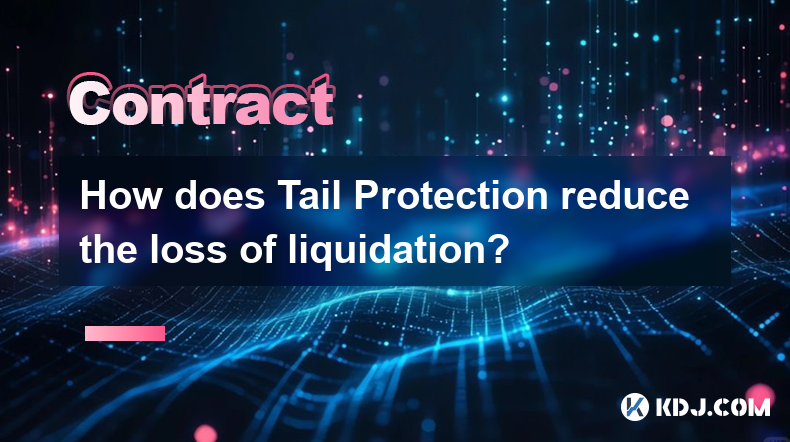
How does Tail Protection reduce the loss of liquidation?
Apr 11,2025 at 01:50am
Introduction to Tail Protection in CryptocurrencyTail Protection is a mechanism designed to mitigate the risks associated with liquidation in cryptocurrency trading. Liquidation occurs when a trader's position is forcibly closed by the exchange due to insufficient margin to cover potential losses. This often happens in leveraged trading, where traders b...
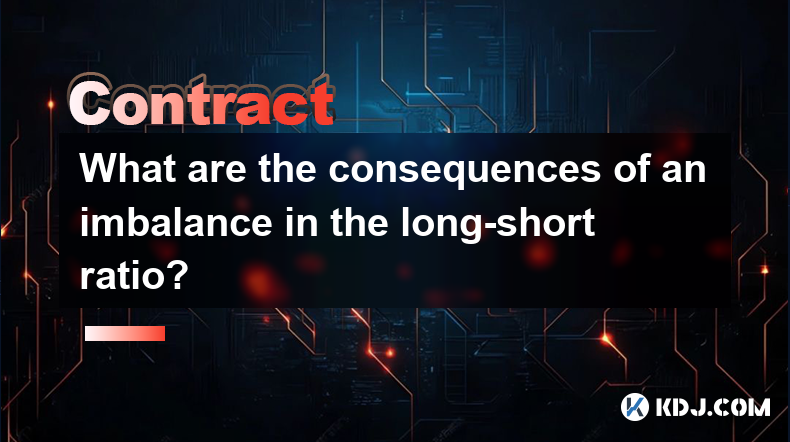
What are the consequences of an imbalance in the long-short ratio?
Apr 13,2025 at 02:50pm
The long-short ratio is a critical metric in the cryptocurrency trading world, reflecting the balance between bullish and bearish sentiments among traders. An imbalance in this ratio can have significant consequences on the market dynamics, affecting everything from price volatility to trading strategies. Understanding these consequences is essential fo...
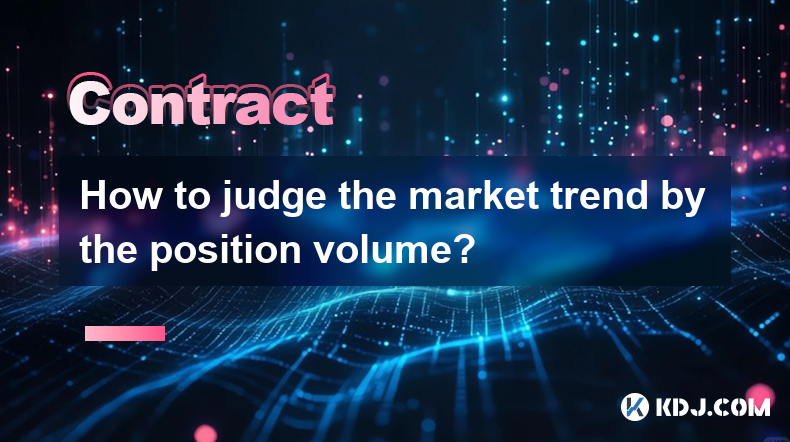
How to judge the market trend by the position volume?
Apr 11,2025 at 02:29pm
Understanding how to judge the market trend by position volume is crucial for any cryptocurrency trader. Position volume, which refers to the total number of open positions in a particular cryptocurrency, can provide valuable insights into market sentiment and potential price movements. By analyzing this data, traders can make more informed decisions ab...

Why does a perpetual contract have no expiration date?
Apr 09,2025 at 08:43pm
Perpetual contracts, also known as perpetual futures or perpetual swaps, are a type of derivative product that has gained significant popularity in the cryptocurrency market. Unlike traditional futures contracts, which have a fixed expiration date, perpetual contracts do not expire. This unique feature raises the question: why does a perpetual contract ...
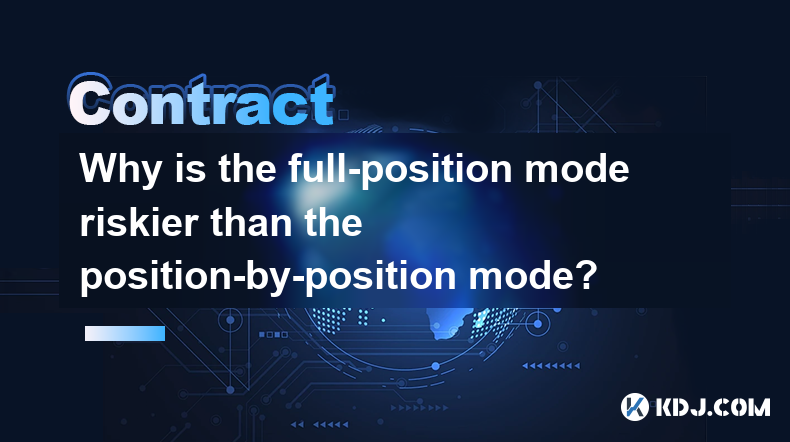
Why is the full-position mode riskier than the position-by-position mode?
Apr 13,2025 at 03:42pm
Why is the Full-Position Mode Riskier Than the Position-by-Position Mode? In the world of cryptocurrency trading, the choice between full-position mode and position-by-position mode can significantly impact the risk profile of a trader's portfolio. Understanding the differences between these two modes is crucial for making informed trading decisions. Th...
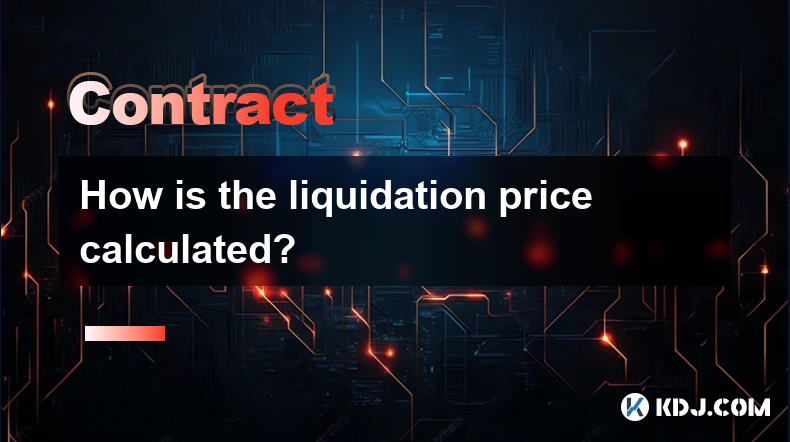
How is the liquidation price calculated?
Apr 12,2025 at 01:35am
Introduction to Liquidation PriceLiquidation price is a critical concept in the world of cryptocurrency trading, particularly when dealing with leveraged positions. Understanding how this price is calculated is essential for traders to manage their risk effectively. The liquidation price is the point at which a trader's position is forcibly closed by th...

How does Tail Protection reduce the loss of liquidation?
Apr 11,2025 at 01:50am
Introduction to Tail Protection in CryptocurrencyTail Protection is a mechanism designed to mitigate the risks associated with liquidation in cryptocurrency trading. Liquidation occurs when a trader's position is forcibly closed by the exchange due to insufficient margin to cover potential losses. This often happens in leveraged trading, where traders b...

What are the consequences of an imbalance in the long-short ratio?
Apr 13,2025 at 02:50pm
The long-short ratio is a critical metric in the cryptocurrency trading world, reflecting the balance between bullish and bearish sentiments among traders. An imbalance in this ratio can have significant consequences on the market dynamics, affecting everything from price volatility to trading strategies. Understanding these consequences is essential fo...

How to judge the market trend by the position volume?
Apr 11,2025 at 02:29pm
Understanding how to judge the market trend by position volume is crucial for any cryptocurrency trader. Position volume, which refers to the total number of open positions in a particular cryptocurrency, can provide valuable insights into market sentiment and potential price movements. By analyzing this data, traders can make more informed decisions ab...

Why does a perpetual contract have no expiration date?
Apr 09,2025 at 08:43pm
Perpetual contracts, also known as perpetual futures or perpetual swaps, are a type of derivative product that has gained significant popularity in the cryptocurrency market. Unlike traditional futures contracts, which have a fixed expiration date, perpetual contracts do not expire. This unique feature raises the question: why does a perpetual contract ...

Why is the full-position mode riskier than the position-by-position mode?
Apr 13,2025 at 03:42pm
Why is the Full-Position Mode Riskier Than the Position-by-Position Mode? In the world of cryptocurrency trading, the choice between full-position mode and position-by-position mode can significantly impact the risk profile of a trader's portfolio. Understanding the differences between these two modes is crucial for making informed trading decisions. Th...

How is the liquidation price calculated?
Apr 12,2025 at 01:35am
Introduction to Liquidation PriceLiquidation price is a critical concept in the world of cryptocurrency trading, particularly when dealing with leveraged positions. Understanding how this price is calculated is essential for traders to manage their risk effectively. The liquidation price is the point at which a trader's position is forcibly closed by th...
See all articles























































































